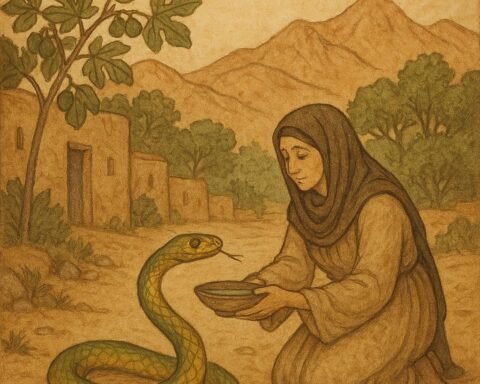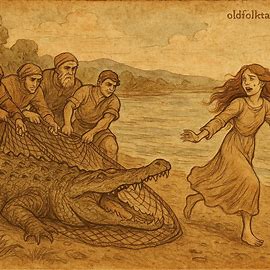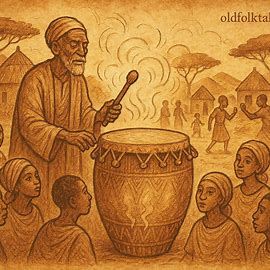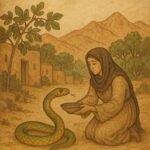Long ago, in the household of Na Kimanaueze kia Tumb’a Ndala, a respected man loved by many, four daughters were born to one mother. There were no sons in this family, only girls. Each daughter, when she came of age, gave herself the same name: Uoua. The eldest said, “I am Uoua,” the second echoed, “I am Uoua,” the third repeated, “I am Uoua,” and the youngest also declared, “I am Uoua.” People around them would wonder: “How will they be known if they all bear the same name?” Yet the sisters carried this shared name proudly, bound in their sisterhood of four.
They grew tall, graceful, and reached the age of marriage. Soon a suitor appeared, a young man seeking the hand of the eldest Uoua. As was custom, he was received as a guest. Food was cooked for him, and when evening came, he was shown into the house where the sisters stayed.
“Good evening, ladies,” he greeted.
“Good evening,” they replied warmly, spreading a mat for him to sit upon.
READ THIS: The Kianda and the Young Woman: An Angolan Folktale of Desire, Loss, and Vigilance.
The man began to speak in riddles and proverbs, boasting of his day and his strength. He compared himself to an elephant that plays yet limps from hunters’ arrows, spoke of paths worn by many feet, of tobacco that makes men spit, and palm wine that loosens tongues. The sisters listened politely. At last, he revealed his true intent: “I came for you, Na Uoua, the eldest.”
The eldest replied firmly: “If you marry me, you must marry all four of us. We are bound as one. If you take only me, then you cannot take me at all.” The young man, though surprised, agreed: “I will marry you all.”
At dawn, he went to Na Kimanaueze, their father, and declared his wish. The father answered, “If you can afford the four, bring me the bride-price.” The young man returned to his father, who provided four cows as dowry. They were delivered, and the marriage was sealed. A date was set: on the fifth day, he would return for his brides.
When that day came, he and his companions collected the four sisters. Each was given her own house, yet together they entered into marriage. Feasts were held, goats slaughtered, and mush prepared. After the celebrations, the companions departed.
But the husband, Na Nzua, avoided their houses. He stayed instead in his bachelor’s dwelling. His father scolded him: “Why do you not go to your wives? They wait, yet you neglect them.” Na Nzua answered: “Shame holds me, for since they arrived, I have not given them fine food. Tomorrow I will hunt, that they may feast on fresh meat.”
At sunrise, he left with his boy, his dog, and his gun. They built a small hut in the bush and set traps. Soon, forty rats were caught. Nzua told his boy: “Bind them into four bundles. Take them to my wives. Deliver them at night, one by one, and say: ‘The bundle that the wise tied, let the fool untie.’ Give each bundle to one wife, but tell her not to speak of it to her sisters.”
The boy obeyed. To the eldest he said the words, then to the second, then the third, and finally the youngest. Each wife stored the bundle away, except the youngest. Curious, she opened hers. She cleaned the rats, shaved them, cooked them, and dried them on a spit. She kept silent.
Ten days passed. Nzua returned from the bush. He went first to the eldest: “Bring the bundle I sent you.” She opened her box, but the bundle was rotten and filled with maggots. The same happened with the second and the third sisters. Finally, he went to the youngest. She took down the spit from her roof, and there were the rats, dried and preserved.
Nzua laughed with joy. He called the people of the village and declared: “I sent four bundles to my wives. Three kept them until they spoiled. One, the youngest, prepared and preserved them. She alone showed wisdom. The eldest three are fools; they have no intelligence. I will remain with the youngest.”
The eldest three left in shame, while the youngest kept her husband by her cleverness. From this came the saying: “Elder and younger shall not marry one man,” for strife arises when the younger surpasses her elders in shrewdness.
Thus, the tale of the Four Uouas was told and finished.
Moral Lesson
This folktale reminds us that wisdom, foresight, and responsibility are greater treasures than age or beauty. The eldest sisters lost their place not because they were unloved, but because they failed to act wisely. The youngest, though last in birth order, proved herself the most capable through vigilance and action. True worth is shown in deeds, not in words or position.
Knowledge Check
1. Who was the father of the four Uouas?
Na Kimanaueze kia Tumb’a Ndala.
2. What condition did the eldest Uoua set for marriage?
That the man must marry all four sisters, not just her alone.
3. What did Na Nzua send to his wives while hunting?
Four bundles of trapped rats.
4. What special phrase did the boy deliver with each bundle?
“The bundle that the wise tied, let the fool untie.”
5. How did the youngest Uoua show wisdom?
She cleaned, cooked, and dried the rats, preserving them.
6. What cultural lesson is expressed in the proverb that ends the story?
That elders and younger siblings should not share a husband, as rivalry and fairness may be disrupted.
Source: Traditional Kimbundu folktale, Angola.







